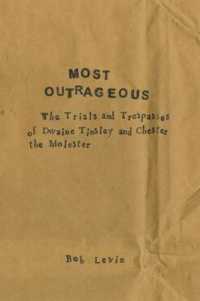- ホーム
- > 洋書
- > 英文書
- > Literary Criticism
Full Description
Transnational Canadas marks the first sustained inquiry into the relationship between globalization and Canadian literature written in English. Tracking developments in the literature and its study from the centennial period to the present, it shows how current work in transnational studies can provide new insights for researchers and students.
Arguing first that the dichotomy of Canadian nationalism and globalization is no longer valid in today's economic climate, Transnational Canadas explores the legacy of leftist nationalism in Canadian literature. It examines the interventions of multicultural writing in the 1980s and 1990s, investigating the cultural politics of the period and how they increasingly became part of Canada's state structure. Under globalization, the book concludes, we need to understand new forms of subjectivity and mobility as sites for cultural politics and look beyond received notions of belonging and being.
An original contribution to the study of Canadian literature, Transnational Canadas seeks to invigorate discussion by challenging students and researchers to understand the national and the global simultaneously, to look at the politics of identity beyond the rubric of multiculturalism, and to rethink the slippery notion of the political for the contemporary era.
Contents
Transnational Canadas: Anglo-Canadian Literature and Globalization by Kit Dobson
Introduction: Globalization and Canadian Literature
PART ONE: Reconstructing the Politics of Canadian Nationalism
Introduction to Part One
Chapter One: Spectres of Derrida and Theory's Legacy
Chapter Two: Ambiguous Resistance in Margaret Atwood's Surfacing
Chapter Three: Nationalism and the Void in Dennis Lee's Civil Elegies
Chapter Four: Leonard Cohen's Beautiful Losers and the Crisis of Canadian Modernity
Conclusion to Part One
PART TWO: Indigeneity and the Rise of Canadian Multiculturalism
Introduction to Part Two
Chapter Five: Critique of Spivakian Reason and Canadian Postcolonialisms
Chapter Six: Multiculturalism and Reconciliation in Joy Kogawa's Obasan
Chapter Seven: Multicultural Postmodernities in Michael Ondaatje's In the Skin of a Lion
Chapter Eight: Dismissing Canada in Jeannette Armstrong's Slash
Conclusion to Part Two
PART THREE: Canada in the World
Introduction to Part Three
Chapter Nine: Transnational Multitudes
Chapter Ten: Mainstreaming Multiculturalism? The Giller Prize
Chapter Eleven: Global Subjectivities in Roy Miki's Surrender
Chapter Twelve: Writing Past Belonging in Dionne Brand's What We All Long For
Conclusion to Part Three
Conclusion: Transnational Canadas
Bibliography
Index








